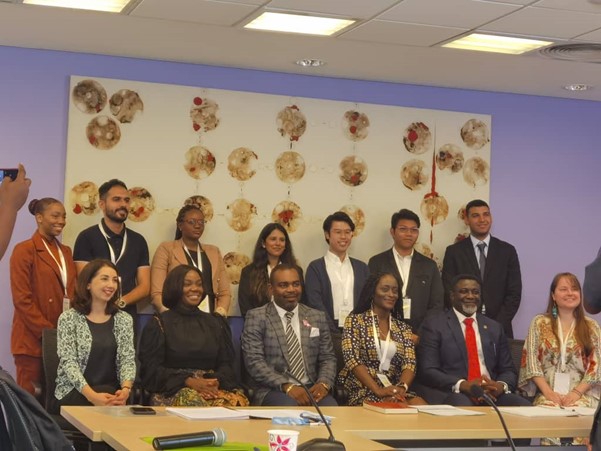The Climate Investment Funds (CIF) in collaboration with their six multilateral development bank (MDB) partners have officially launched the first cohort of CIF-MDB Youth Fellowship Programme, an initiative aimed at empowering young climate leaders to actively contribute in global climate action.
The CIF-MDB Youth Fellowship Programme, a one-year initiative, provides selected candidates with the unique opportunity to work with CIF and MDBs on frontier climate finance and climate action programmes. Seven Fellows, representing six countries and five global regions, have been chosen to embark on this exciting journey.
“The seven Fellows who have been selected as the first cohort for the CIF-MDB Youth Fellowship Programme hail from six countries and five regions of the globe. They will be onboarded and equipped with the basic tools to start their one-year programme,” remarked Michelle Keane, Country Operations Manager-World Bank Office in Accra. She expressed the collective enthusiasm of MDB partners and CIF in welcoming the young climate leaders.
“Clearly, your passion, innovation and determination as young people and young climate leaders are essential to address the most pressing global challenges, and particularly the climate crisis,” emphasised Keane. “You, as the emerging leaders, represent the future of climate action; and we are excited to witness how your respective contributions will drive meaningful change.”
The CIF Youth Fellowship Programme aims to provide young climate leaders with an opportunity to work with projects co-financed by CIF in their respective countries, in partnership with six multilateral development banks: the African Development Bank, the Asian Development Bank, the European Bank for Reconstruction and Development, the Inter-American Development Bank, the World Bank and the International Finance Corporation.
This programme offers a comprehensive experience in areas such as nature-based solutions, clean energy, adaptation and climate resilience, energy access, and gender and social inclusion. Furthermore, it encourages cross-learning, networking and establishing meaningful partnerships among fellow youths and country and MDB partners. Through these interactions, Fellows will play a pivotal role in shaping climate finance programmes to better address youth needs and voices while expanding the network of young climate experts engaged in climate action.
Dora Nsuwa Cudjoe, Senior Operations Officer at the Climate Investment Funds, elucidated the programme’s significance: “The Climate Investment Funds Youth Fellowship Programme is primarily an opportunity to select youth leaders in climate action to work with our multilateral development banks”.
In Ghana, the programme operates in collaboration with the International Finance Corporation, African Development Bank and World Bank to support government’s climate adaptation and mitigation agenda. Ms. Cudjoe emphasised that youth are now recognised as important contributors to climate change discussions, bringing innovation, creativity and a willingness to take risks.
The Climate Investment Funds, founded in 2008, play a crucial role in providing concessional resources to low- and middle-income countries for the development of low-carbon and climate-resilient pathways. Currently holding approximately US$11billion in assets, the CIF has leveraged over US$64billion in both public and private financing across 74 countries, including Ghana.
The programme’s two-tiered approach involves identifying and empowering a group of youth leaders in climate action, in partnership with multilateral development banks. These youth leaders are then equipped with structured training to enhance their capacity and effectiveness in their roles.
Through the programme, six projects co-financed by the Climate Investment Funds and implemented by multilateral development banks have been established. These projects are coordinated by the Asian Development Bank, the Inter-American Development Bank, the African Development Bank, the European Bank for Reconstruction and Development, the World Bank and the International Finance Corporation. Each Fellow is assigned to one of these MDBs, with two working from Thailand.
One notable example of the youths’ impact is in Ghana, where youth-led businesses are contributing to climate resilience. These businesses receive support through the Ghana Climate Innovation Centre, a collaborative effort with government. Keane noted that most of these businesses are in their early stages of development, emphasising the essential role of youth in driving climate-related initiatives.
Beyond the Fellowship Programme, youth engagement in climate action remains a global priority. The World Bank, alongside its various projects empowering young people, nurtures the Youth to Youth (Y2Y) initiative. This dynamic community of young professionals, both within and beyond the World Bank Group, actively contributes fresh ideas and perspectives toward the mission of a world free from poverty and the achievement of Sustainable Development Goals.
The Y2Y initiative encompasses core programmes such as Mentorship, Global Youth Climate Network (GYCN), Youth Innovation Fund and Youth Voices, which amplify the impact of young voices in the realm of climate action.
In the words of Michelle Keane: “To our esteemed Fellows, we say thank you for your dedication to the cause of climate action. We are eager to embark on this journey with you, harnessing your drive for results to deliver something truly remarkable. Your commitment reflects the essence of what the World Bank stands for – creating a better world for all on a livable planet”.
The CIF-MDB Youth Fellowship Programme launch signals a commitment to youth empowerment and inclusive climate action, promising a brighter, more sustainable future for all. Partners and colleagues from various organisations, including the African Development Bank, the Ghana Climate Innovation Centre, the Arab Youth Centre on Climate Change, the International Finance Corporation and Office of the UN Secretary-General’s Envoy for Youth have joined forces to support the programme’s success.










